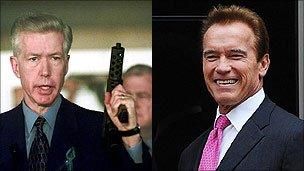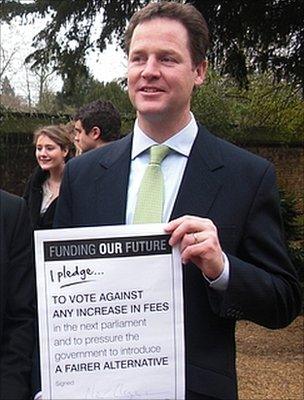Tuition fees: Could recall powers unseat Nick Clegg's MPs?
- Published
The National Union of Students is urging a US-style "recall" of Lib Dem MPs who back university tuition fee rises, despite promising to oppose them before the election. But could it really happen?

He'll not be back: Could Lib Dems face Arnie-style termination like Gray Davis (left)?
Gray Davis, the former governor of California, offers a pretty-much unblemished CV.
Among more than 70 achievements listed on his website are the "largest-ever" expansion of financial help for college students and getting more transport projects under way "than at any time in history".
What the one-time golden boy of the Democratic Party fails to mention, though, is that he was booted out of office in 2003.
Mr Davis was removed by a form of people power known as "recall", allowing the electorate to oust unpopular officials and representatives if they gain enough signatures to prompt a vote on their future.
His departure allowed the Austrian-born Hollywood hard man Arnold Schwarzenegger to muscle his way into office.
Judging by Mr Davis's CV, the brutal nature of the episode still hurts. And some of the same pain could be on its way to the UK soon.
The coalition government has promised to bring in a power of recall for MPs as early as next November.
'Robust and fair'
But not quite on the Californian model.
Under the British plans, an MP would have to be shown to have committed "serious wrongdoing" - basically fraud or another crime - before recall proceedings could start.
And it would be only if a parliamentary committee made up of other MPs decided serious wrongdoing had been committed that people power would be allowed in to the process.

Nick Clegg says the proposed tuition fees system will be fairer than the current arrangements
People living in the errant MP's constituency would then be allowed to get a recall petition going - and if at least 10% of voters sign it, a constituency-wide ballot would be triggered.
If the sitting MP loses, they would be removed and a by-election take place.
These are some rather big "ifs".
A Cabinet Office spokeswoman told the BBC: "Our intention is to establish a recall mechanism which is transparent, robust and fair."
However, the scope for removing an MP will still be much narrower than in California.
Mere unpopularity will not result in the termination of a Westminster career.
Breaking pre-election promises does not look like being grounds for recall, unless the definition of serious wrongdoing is stretched well beyond any recognisable legal meaning.
The National Union of Students is urging further reform.
It is furious at Liberal Democrats who signed a pledge earlier this year not to raise university tuition fees, but now, in government, back plans to increase them to a maximum of £9,000 a year.
So, the NUS is planning to campaign directly against the Lib Dems in parliamentary seats including Sheffield Hallam, held by party leader and Deputy Prime Minister Nick Clegg.
'King-makers'
One of its tactics is to set up a petition asking for them to be recalled if they vote in Parliament to raise fees.
Joshua Forstenzer, president of Sheffield University Students' Union, said: "If we have the the power of recall, we should have the power to remove MPs on democratic grounds.
"What we are trying to say is that in a democracy, when someone makes a pledge, you expect them to honour and fulfil that pledge."
The Lib Dems are governing in partnership with the Conservatives which, they argue, means compromises on policies offered before May's general election, including those on fees.
Mr Clegg says that the changes being proposed for tuition fees in England will mean there's a fairer system in place and graduates on lower incomes would be better off than they are now.
But Mr Forstenzer said: "The Lib Dems are the king-makers. If they want, they can vote down policies that the Conservatives propose.
"If they flip-flop or do a U-turn on this issue, they are betraying the electorate. It is a fundamental democratic principle that we should be able to remove them."
So does what the government is proposing on recall bear any real resemblance to the US system? Well, yes and no.
The power of recall is in place in 18 US states and applies only to representatives and officials elected at state, rather than national, level.
Of these states, eight stipulate that voters have to highlight specific grievances, mainly corruption or provable incompetence, to initiate a ballot.
But in the other 10, such as California and Michigan, the decision is seen as purely "political", rather than "judicial": if they are unpopular enough, they can be forced out.
Apart from Gray Davis, though, only one other US state governor has ever been recalled, in North Dakota in 1921.
Even in California, prior to Mr Schwarzenegger's victory, there were 32 failed attempts to unseat the boss.
Jennie Bowser, of the National Conference of State Legislatures, said: "A successful recall is very rare at a state-wide level. It happens much more frequently with local officials and legislators in state senates and houses of representatives.
"One thing that people have to bear in mind is that voters, when they have made a decision, don't like it being questioned by a court, or a committee, or anyone else.
"That makes recall votes difficult to achieve. It's not easy."
Real life is almost always too complicated for a Hollywood ending, it seems.